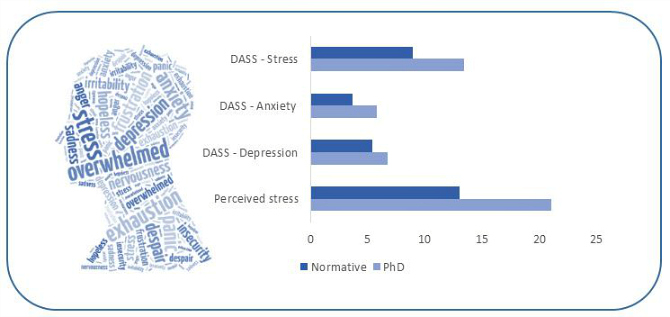Poor mental health amongst PhD researchers is increasingly being recognised as an issue within higher education institutions. However, there continues to be unanswered questions relating to the propensity and causality of poor mental health amongst PhD researchers. Reporting on a new comparative survey of PhD researchers and their peers from different professions, Dr Cassie M Hazell and Dr Clio Berry find that PhD researchers are particularly vulnerable to poor mental health compared to their peers. Arguing against an inherent and individualised link between PhD research and mental health, they suggest institutions have a significant role to play in reviewing cultures and working environments that contribute to the risk of poor mental health.
Evidence has been growing in recent years that mental health difficulties are common amongst PhD students. These studies understandably have caused concern in academic circles about the welfare of our future researchers and the potential toxicity of academia as a whole. Each of these studies has made an important contribution to the field, but there are some key questions that have thus far been left unanswered:
- Is this an issue limited to certain academic communities or countries?
- Do these findings reflect a PhD-specific issue or reflect the mental health consequences of being in a graduate-level occupation?
- Are the mental health difficulties reported amongst PhD students clinically meaningful?
We attempted to answer these questions as part of our Understanding the mental health of DOCtoral researchers (U-DOC) survey. To do this we surveyed more than 3,300 PhD students studying in the UK and a control group of more than 1,200 matched working professionals about their mental health. In our most recent paper, we compared the presence and severity of mental health symptoms between these two groups. Using the same measures as are used in the NHS to assess symptoms of depression and anxiety, we found that PhD students were more likely to meet criteria for a depression and/or anxiety diagnosis and have more severe symptoms overall. We found no difference between these groups in terms of their overall suicidality. However, survey responses corresponding to past suicidal thinking and behaviour, and future suicide intent were generally highly rated in both groups.
42% of PhD students reported that they believed having a mental health problem during your PhD is the norm
We also asked PhD students about their perceptions and lived experience of mental health. Sadly, 42% of PhD students reported that they believed having a mental health problem during your PhD is the norm. We also found similar numbers saying they have considered taking a break from their studies for mental health reasons, with 14% actually taking a mental health-related break. Finally, 35% of PhD students have considered ending their studies altogether because of their mental health.
We were able to challenge the working theory that the reason for our findings is that those with mental health difficulties are more likely to continue their studies at university to the doctoral level. In other words, the idea that doing a PhD doesn’t in any way cause mental health problems and these results are instead the product of pre-existing conditions. Contrary to this notion, we found that PhD students were not more likely than working professionals to report previously diagnosed mental health problems, and if anything, when they had mental health problems, these started later in life than for the working professionals. Additionally, we found that our results regarding current depression and anxiety symptoms remained even after controlling for a history of mental health difficulties.
The findings from this paper and our other work on the U-DOC project has highlighted that PhD students seem to be particularly vulnerable to experiencing mental health problems. We found several factors to be key predictors of this poor mental health; specifically not having interests and relationships outside of PhD studies, students’ perfectionism, impostor thoughts, their supervisory relationship, isolation, financial insecurity and the impact of stressors outside of the PhD.
the current infrastructure, systems and practices in most academic institutions, and in the wider sector, are increasing PhD students’ risk of mental health problems and undermining the potential joy of pursuing meaningful and exciting research
So, does this mean that doing a PhD is bad for your mental health? Not necessarily. There are several aspects of the PhD process that are conducive to mental health difficulties, but it is absolutely not inevitable. Our research (and our own experiences!) suggests that doing a PhD can be an incredibly positive experience that is intellectually stimulating, personally satisfying, and gives a sense of meaning and purpose. We instead believe a more appropriate conclusion to draw from our work is that the current infrastructure, systems and practices in most academic institutions, and in the wider sector, are increasing PhD students’ risk of mental health problems and undermining the potential joy of pursuing meaningful and exciting research.
Reducing this issue to the common rhetoric that “PhD studies cause mental health problems” is problematic for several reasons: Firstly, it ignores the many interacting moving parts at work here that variably increase and reduce risk of poor mental health across people, time, and place. Secondly, it does not acknowledge the pockets of incredibly good practice in the sector we can learn from and implement more widely. Finally, it reinforces the notion that poor mental health is the norm for PhD students which then becomes a self-fulfilling prophecy- and itself ignores the joy of pursuing a thesis in something potentially so personally meaningful. Nonetheless, a significant paradigm shift is needed in academia to reduce the current environmental toxins so that studying for a PhD can be a truly enjoyable and fulfilling process for all.
Note: This article gives the views of the author, and not the position of the Impact of Social Science blog, nor of the London School of Economics. Please review our Comments Policy if you have any concerns on posting a comment below.
Image Credit: Geralt via Pixabay.









My own experience of doing a PhD (loneliness, the lack of routine, imposter syndrome) has led to my discouraging my daughter, who has a history of mental health issues, from considering it at the moment, despite her having the academic aptitude and even a topic. I would hazard a guess that the problems are worse in the humanities than in the applied sciences, where most PhD students tend to work as part of research teams and be well supported in more structured environments.
Fascinating research… I had a terrible PhD, but most of the mental health issues arose after the fact. If you ever conducted another survey it would be interesting to include those who had recently finished a PhD.
Looking at your follow up BJPsyche paper, I noticed you haven’t gone into the correlation between subject and mental health. I’d be interested to know how sciences vs humanities compared.
I see that your work is very restrained in discussing the causes of mental health issues, and I’m sure you have plenty of hypothesis. In my experience, a key factor is that there is no mechanism to hold supervisors to account for the quality of their supervision. (Linking to the point above, I believe in the sciences supervisors with poor outcomes do suffer repetitional damage – not so in the humanities.)
I’d also add that the UK’s Viva system, which I believe is unique globally, is a recipe for disaster – years of work evaluated over the course of just a couple of hours by examiners who, again, are not held accountable in any way.
I wrote my experience up here:
https://medium.com/the-faculty/i-had-a-brutal-phd-viva-followed-by-two-years-of-corrections-here-is-what-i-learned-about-vivas-5e81175aa5d